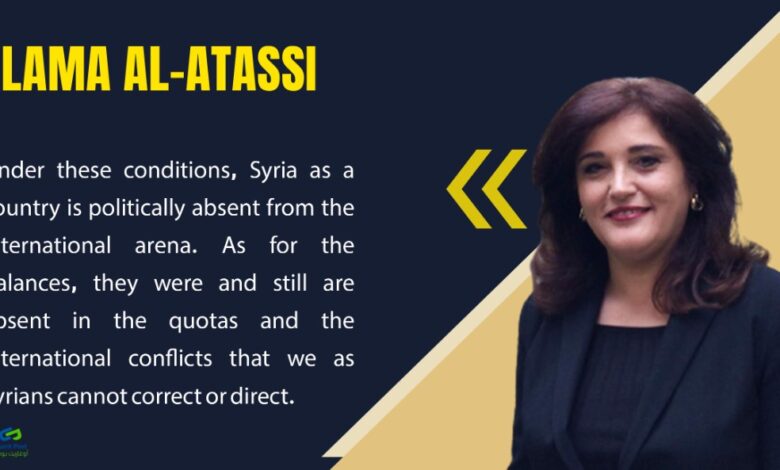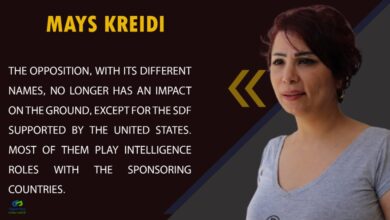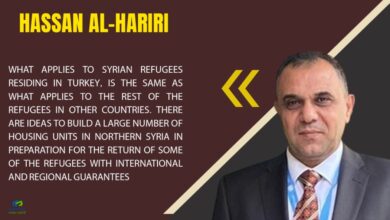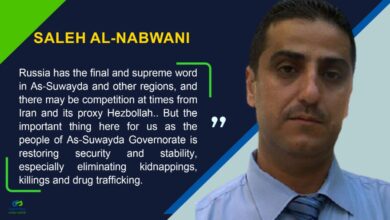Lama Al-Atassi to Ugarit: A new national unity will come during the year 2023.. and the economic collapse in Syria is political par excellence
During an exclusive interview with the researcher at American Center for Levant Studies, Lama Al-Atassi, the “Ugarit Post” network raised many questions about reading the Syrian crisis in light of the developments and events that took place in 2022, and the efforts for rapprochement between the government of Damascus and Turkey, in addition to many questions and propositions.

How can the crisis in Syria be read in light of the developments and events that took place in 2022?
I still read the events in Syria as a revolution, not a crisis. It is a revolution of a new kind in a world unlike its past. The revolution is a process of challenging reality, and the Syrian people, or at least a significant part of it, decided of their own free will to embark on the process of challenge.. I say a challenge because the world has never accepted this. Everyone thought that the issue would be limited to a war of influence between the United States, Russia, and China.. But the Syrian people, from their point of view, were determined to change from within the rules of the external game.. For this we paid a heavy price, more than what the Arab Spring countries paid.
Where is Syria in the international equation when talking about the changing balances, alliances and international conditions due to the current events in the world?
Under these conditions, Syria as a country is politically absent from the international arena. As for the balances, they were and still are absent in the quotas and the international conflicts that we as Syrians cannot correct or direct.
Perhaps Bashar al-Assad’s choice of the Iranian axis since the beginning of his rule caused the Syrians to lose their sovereignty permanently. I mean, after the end of the Cold War, the collapse of the Soviet Union, and the death of Hafez al-Assad, Syria was at a crossroads.
Bashar al-Assad had to achieve an internal and external transformation, as Syria is an important and pivotal country economically and politically in the region, but he preferred to sell it to Iran in exchange for remaining in power.
The Syrian economy has collapsed dramatically in the year 2022, and the citizen is living in a difficult situation in very harsh conditions.. What are the reasons for this, and do you think there are solutions to save the economy?
There are always solutions.. The economic collapse is political par excellence, and the blockade imposed on Syria was a necessary evil to deter Iran in Syria. Iran is employing Bashar al-Assad and his “gang,” of course, along with Russia. Therefore, to get out of the current economic impasse, there is no solution other than the political solution.
In conjunction with the talk about the Syrian solution… there are efforts for rapprochement between the government of Damascus and Turkey… How do you read this development… and can it contribute to resolving the crisis?
There are two types of reading, the first is emotional reading, and here we must admit that the Syrian revolutionary feels disappointed with Turkey and its decision to reconcile with Bashar al-Assad’s regime.
But on a second reading of the situation, we are objectively obliged to admit that we do not know the secrets of things and where they are going.
In the end, the dialogue between Turkey and the Syrian regime is an inevitable dialogue.. In all wars, a negotiated discussion is necessary to end the war, and in the Syrian case, unfortunately, we noticed that there is a complete absence of political war. Representation of the Syrian opposition. Representation of the Syrian opposition street.. The coalition is popularly rejected and has no representation in the street. From here, Erdogan took an empty place, addressing the regime instead of the Syrian people.. And internationally, a strong party with real influence had to stand in front of Bashar, and this was for Bashar al-Assad to respect him.. Bashar al-Assad did not accept serious dialogue with the Syrians, and the regime did not accept it. The opposition is in Geneva, as the news agencies claim.
I was in a meeting with the regime delegation in Moscow 2, and I said at the time that the regime does not see anyone from the opposition who does not respect the opposition. We were not represented and it is not possible to find representation on behalf of the people in the current circumstances.
Turkey supported the revolution, and the Syrian street accused it of weakening its leadership. Perhaps it feared its time for its security, so it decided to contain the political and military leadership and prevent any development in the Syrian situation.
How do you see the future of Idlib, As-Suwayda, and the east of the Euphrates during 2023?
The arms bearers who imposed their laws in Idlib and east of the Euphrates must explain to us, each of them, what they want from Syria?
What does the Autonomous Administration want from Syria? There is a question raised by the Syrian street, why did they not join the revolution against Bashar, and why did they pass through the Kurdish state of isolation without consulting the Syrian Kurds?
As for the areas of Idlib, there is al-Qaeda and Jabhat al-Nusra led by al-Julani: here the situation is different, as there is popular discontent.
As for As-Suwayda, what is happening in it cannot be compared to the two aforementioned regions, as it is now not a country ruled by an army.
What are your expectations for 2023?
We are optimistic about the beginning of crystallizing a new national awareness towards a new national unity.. Yes, optimistic.. If rapprochement and agreement take place in the light of the Geneva outcomes, then this means concessions on the part of the regime.. But what I know is that the Syrian street is continuing and is now declaring it clearly.





